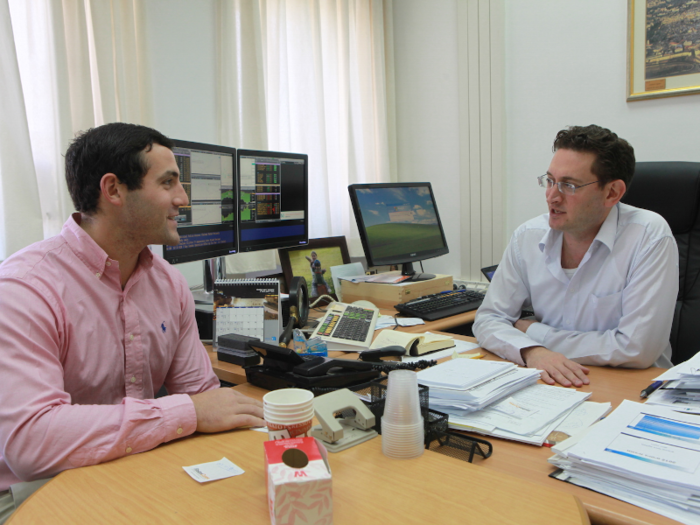- Home
- slideshows
- miscellaneous
- 16 bosses reveal what they wish employees would tell them on their first day
16 bosses reveal what they wish employees would tell them on their first day
"What their vision of success will look like."

"What they want to learn from me — and need to learn for the job."

Siddhartha Gupta, CEO of Mercer Mettl, an HR technology company, told Business Insider via email that it's great when a new employee has done their homework about the company, as well as read fellow employees' LinkedIn profiles.
"So, on their first day, I would really love to hear what they want to learn from me in the time that we work together," he said. "For me, that delineates what career mentoring to provide them, how to mold them for their career and professional growth, and what resources I can offer at their disposal."
Ratko Ivanović, founder of Zeal Agency, said the same, but with a twist.
"I wish each new employee would ask the following question on their first day: 'What do I need to learn in the next few weeks?'" he said.
Similarly, Ivanović said other good first-day questions are "Who should I talk to most from the team?" and "What should I focus on most in the next few weeks to make sure I settle in the position as soon as possible and start creating impact for the company?"
"What motivates them."

Chances are, certain aspects of a new job will inspire the employee more than others.
"One of the most important things I wish new hires would tell me on their first day is what motivates them," Jason Wirick, client success director at BizLibrary, told Business Insider in an email.
He said this includes: What are they passionate about? What makes them tick? What is their 'why'?
"This helps us connect on a human level and becomes the foundation to help keep the employee motivated and engaged on an ongoing basis," Wirick said.
Sarkis Hakopdjanian, director of strategy and principal for The Business Clinic, said he also likes for employees to share what motivates them, starting on their first day.
"Knowing what motivates a person is one of the most effective ways to manage them, as you know what they're working towards," he told Business Insider in an email. "For some people, it's money, for others, it's career potential, status, praise, meaning, or purpose, and so on. Focusing on motivating all employees using the same rewards — such as a bonus — isn't as effective as creating individual rewards for each person based on their intrinsic motivations."
"Ask questions."

"On their first day, people can get shy or nervous and not want to appear inept," Casey Hill, growth manager at Bonjoro, told Business Insider in an email. "Everyone is clueless on day one — everyone."
But by asking questions, someone indicates that they're engaged, focused, and looking to pick things up quickly, she said.
Jason Yau, vice president of e-commerce and general manager at CanvasPeople, also thinks an employee asking questions on their first day is important.
"I like to get any question pertaining to the company, as I think it demonstrates a certain degree of eagerness and curiosity," he told Business Insider in an email. "I also don't mind some casual conversation, as I like employees to feel comfortable around me."
He said while it might be intimidating to have a casual conversation with any boss on the first day — as an employee, you are still trying to gauge the culture and what type of conversation is appropriate — he highly encourages it, so long as it doesn't interfere with your level of productivity.
"If you have any reservations regarding social boundaries."

Although every office is different in terms of social boundaries, if you have any concerns about them, say something your first day, Reuben Yonatan, founder and CEO of GetVoIP, told Business Insider in an email.
"Before your first day, you should already have a feel for our company culture," he said. "All the same, I want to know if you have any concerns about interacting with your coworkers, whether it's surrounding an area of your private life or something you've observed of a new colleague."
As the CEO, he said it's his job to keep information confidential, but he can't help a new employee if they don't speak up.
"How they'd like to receive feedback."

Kristen Fowler, practice lead for Clarke Caniff Strategic Search, said that an employee stating how they'd like to receive feedback is very helpful for their boss to know from day one.
"Understanding how an individual receives feedback — such as if they prefer public praise or direct feedback — takes time and effort from both parties," she told Business Insider in an email. "It helps cuts down the learning curve and allows both parties to hit the ground running while preventing any misconceptions."
Wayne Turmel, cofounder of the Remote Leadership Institute, also emphasized the importance of sharing communication and feedback styles.
"How do they want to be communicated with? Do they like short, frequent communication, or longer, less frequent conversations?" he told Business Insider.
Although there's going to be a lot of coaching and information in the first few days and weeks of a new hire's job, understanding their preferences for feedback will help, he said.
"They ask if they can come in early or work on weekends."

When a new employee is proactive and responsible, it bodes well for the employer, Bryan Zawikowski, vice president and general manager of the military division for LucasGroup.com, an executive recruiting firm, told Business Insider in an email. For instance, on their first day, if the employee asks if they can come in early the next day, it tells the hiring manager they probably won't have to worry about them showing up late for work, Zawikowski said.
"It shows that the candidate is thinking about what extra things they can do to ensure they are set up for success and are high achievers," he said.
The same goes for if the new hire asks if they're allowed to work on weekends.
"This displays that they're willing to invest their personal time in their profession," Zawikowski said. "Work-life balance isn't always 50% work and 50% life."
He said true work-life balance means you have put yourself in a position where you can be "out-of-balance" one way or the other sometimes when it's necessary to get the job done.
"If you have any health or personal issues that may impact your work."

Despite being healthy enough to work a job every day, if you have an underlying health condition, it's important to tell your employer about it, real estate agent Chantay Bridges told Business Insider in an email.
"While one person may be prone to seizures, another could be diabetic, or have bad migraines," she said. "Then, if we see your head on your desk, we may have a clue as to why and not listen to the office gossip that you have a hangover."
To that point, she also said to make sure to vocalize what your employer should do in a worst-case scenario, including who should be notified.
Joy Altimare, chief brand and engagement officer at EHE Health, said it's also helpful to reveal any personal or family obligations that will require you to leave work early.
"As a boss, I value true transparency — it allows both of us to have an honest conversation around expectations and bandwidth," she told Business Insider in an email. "Today, with flex hours and technology, we can work on a plan that allows you to not feel the pressure at the end of the day. Additionally, it reduces anyone's perception that you're not involved or dedicated to the team."
Vladimir Gendelman, founder and CEO of Company Folders, said he prefers learning about personal conflicts in advance.
"This way, if it may impact their work, I can cater assignments and expectations better for the best productivity," he told Business Insider in an email.
"Give some feedback at the end of the day."

Nate Masterson, chief marketing officer for Maple Holistics, said he thinks it's good for an employee to give some feedback at the end of their first day.
"This can be something that shows they've absorbed a lot of information and are able to process it," he told Business Insider. "Bosses appreciate hearing messages such as 'I got a better understanding of the work we do' or 'I really learned a lot today about x, y, and z.'"
Masterson said that all a boss expects from employees on day one is for them to observe and retain information — so when an employee indicates that they made the most of their first day, it makes bosses happy.
Andrew Taylor, director of Net Lawman, shared a similar sentiment.
"During the years I've run my business, I always thought that the first few days of a new employee's career is important," he told Business Insider in an email. "It's the period when they find their place, test the waters, so to speak, and see for themselves if they really like the job."
He said he hopes new employees could get out of their first-day nervousness mindset and be frank about their views of their new work environment.
"I wish they could tell me what they seem to like and where they can see changes for the better implemented," Taylor said. "I know it's not necessarily a realistic expectation, but by doing so we could at least accommodate some of their wishes in the beginning and show them what they can't quite grasp at first."
- Read more:
- 15 ways to be more productive and manage your time better, according to career experts
- How combining finances is helping this couple pay off nearly $300,000 in debt
- 8 ways to talk to your partner about money, especially when you just started dating
- 7 lessons I never forgot from the best bosses I ever had
Popular Right Now
Popular Keywords
Advertisement